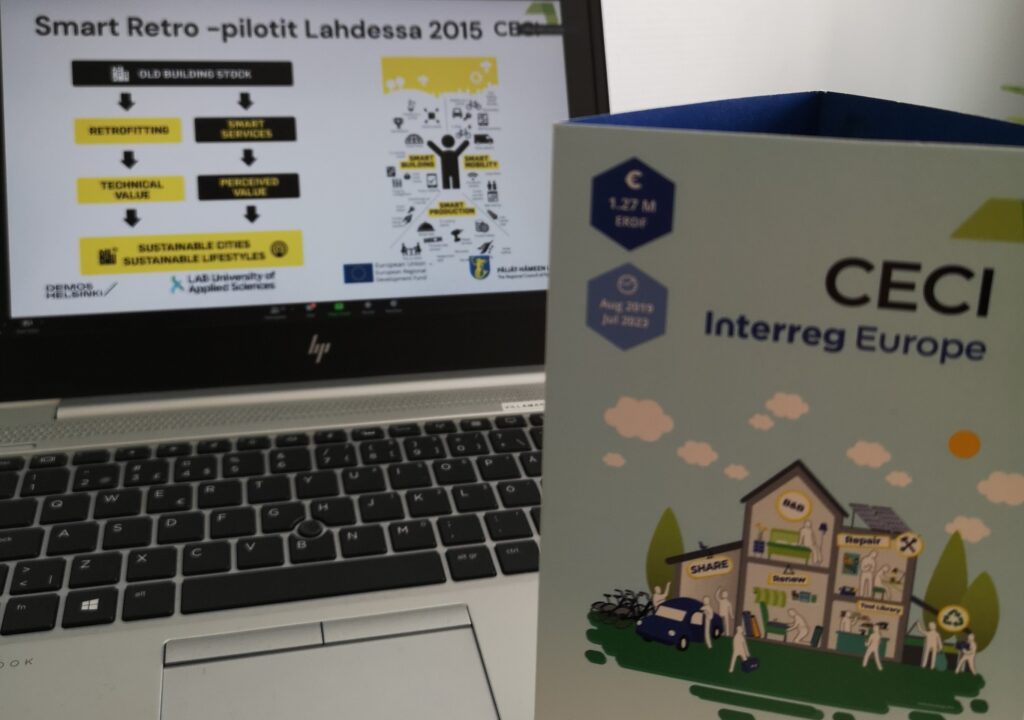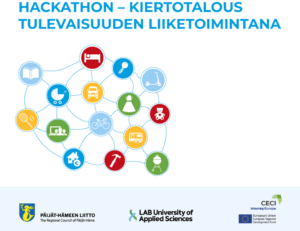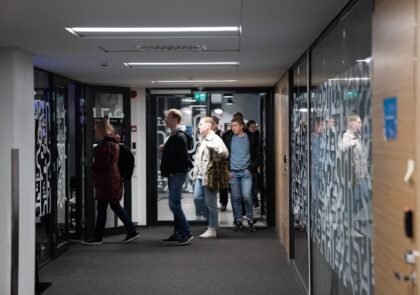
This article highlights general insights on circular economy concepts and implementing successful sharing economy practices in the Päijät Häme region with the help of active citizen participation. The article is written based on reflections from the first part of the two-part Hackathon.
Author: Anna Svartström
Citizen involvement is crucial to implement working systems and functioning service design paths. A hackathon with an inspirational lecture was organized in order to give the participants some basics of the termianology and background information as well as insight to general problems of current circular economy practices and why there is a need for diverse growth in such services.

Image 1. Hackathon invitation poster. (Image: Regional council of Päijät-Häme)
The aim of the hackathon was to introduce and educate the participants about the circular economy concept and provide tools in seeing beyond the current take-make-waste extractive industrial model, and instead lengthen product life cycles and keep products and materials in use (Ellen MacArthur Foundation 2017). The main goal was to engage participants to create ideas for business opportunities of the sharing economy in the Päijät-Häme region and to build new business models within the sharing economy.
The hackathon lecture was organized in April 2021 with key speaker Aleksi Neuvonen, co-founder of the sustainable consultancy company and think thank Demos Helsinki (2021). Neuvonen spoke about the possibilities of sharing economy in the present and in the future and gave insight into the current circular economy situation in Finland, highlighting a few national good practices from the private and public sectors. Furthermore, Neuvonen (2021) dove into sharing economy themes with greater insight and introduced to the participants the following themes: textiles, sustainable housing and services and sustainable mobility and transportation.
Systems thinking and recycling processes around textile waste
The citizen’s role in sustainable use of textiles is crucial, as promoting circular practices like borrowing, renting, sharing, repairing and remodifying are all various forms of reuse that will create new sustainable business potential simultaneously boosting entrepreneurship and the local economy. In 2020, Finns consumed and disposed of 13–18 kilos of textiles each, which accumulates in Finland producing 70–100 million kilos of textile waste annually (Neuvonen 2021). Textile waste is a global and local problem that requires a change of attitude and behavioral change as well as systematic change in services and in the recycling systems (Niinimäki et al. 2020).
European Waste Directive obligates EU countries by 2025 to have a system in place for separate collection of textiles, with processing treatment of waste textiles and separate collection of textile waste by 2025. This encourages new business ventures and technological opportunities for sorting and recycling textile waste. In Finland, the collection of textile waste is scheduled to start in 2023, two years before the time limit required by the EU. The municipalities will be responsible for organizing the collection of textile waste. Thus, the topic of circular textile solutions in the Päijät-Häme region is extremely urgent and important in order to accelerate solutions to the growing global problem of textile waste.
From ownership to renting services
The current trend of housing and services rests on consumption and ownership, which leads to resources being in ineffective use. Neuvonen (2021) emphasized the importance of switching from ownership into sharing economy practices where products should be in constant use instead of occupying space and gathering dust. For instance, a drill is used 11 minutes during its whole life cycle. Thus, citizens should use drills as a sharing economy service instead of buying an actual drill (Neuvonen 2021).
General interest in sharing economy practices is growing, and new kinds of consumers means new way of doing business. Digitalization and globalization are changing consumption since online purchasing is increasing and the production costs are decreasing. Some consumer goods have already been replaced by digital services and surplus items are distributed in applications and tools are purchased for sharing.
Mobility is a crucial part of sharing economy
How to create more options for sustainable and affordable mobility? From an individual perspective, the high purchase price of bus tickets should be related to the cost of transport and not a way of income to the city. As shared use busses and cars offers significant benefits and cuts costs as customers should pay only for use. Sharing economy might also boost and increase profitability for low threshold work opportunities, for example, repairing of bicycles.
We need new sharing and circular business models and adapt new ways of transportation. European car is parked 92% of the time (Ellen MacArthur Foundation 2015). Thus, at least the municipal-owned cars should be rented out to citizens in the evening or weekend or in other way maximize the use. Lahti is named the Green Capital 2021and has very ambitious target of CO2 emission reduction, aiming to become carbon neutral already by 2025. (Lahti Green Capital 2021).
Digitalization and user-centric design are key to find new solutions for circular services. Neuvonen (2021) described how sharing economy can provide additional income to citizens as revolutionary sharing economy services that were functioning practices of the past and will be re-designed to fit future needs. Sharing economy will inspire hybrid professions and boost new paths and routes to entrepreneurship. In short disappearing or disappeared services are re-emerging in new hybrid forms.
The next steps
The inspirational lecture at the Hackathon was organized to give an even advantage to the participants to inspire and prepare for the second part of the Hackathon, where participants co-create and implement new kinds of circular concepts and services in the Päijät-Häme region. These concepts could be further developed by LAB or any citizen, organization, municipality and public or private initiative. The hackathon was organized by CECI lead partner LAB University of Applied Sciences and CECI project partner Regional council of Päijät-Häme. The Hackathon was part of the CECI project as a dissemination event. Interreg Europe funded CECI project is focused on informing good practices of sharing economy solutions, for instance, encouraging citizens to reuse, repair, restore and renew products and services and raising awareness on how residents can participate better in the circular economy in the future (Interreg Europe 2020).
References
Demos Helsinki. 2021. [Cited 19 May 2021]. Available at: https://demoshelsinki.fi/fi/
Ellen MacArthur Foundation. 2017. Building blocks of a circular economy. [Cited 16 Oct 2019]. Available at: https://www.ellenmacarthurfoundation.org/circular-economy/building-blocks
Ellen MacArthur Foundation. 2015. Growth Within: A Circular Economy Vision for a Competitive Europe. [Cited 19 May 2021]. Available at: http://www.ellenmacarthurfoundation.org/news/latest-research-reveals-more-growth-jobs-and-competitiveness-with-a-circular-economy
Interreg Europe. 2020. Project Summary. CECI. [Cited 19 May 2021]. Available at: https://www.interregeurope.eu/ceci/
Lahti green capital 2021. 2021. Carbon-Neutral Lahti. [Cited 14 July 2021]. Available at: https://greenlahti.fi/en/facts
Neuvonen, A. 2021 Demos Helsinki. Hackathon – Kiertotalous tulevaisuuden liiketoimintana
Hackathon Lecturer 8.4.2021.
Niinimäki, K., Peters, G., Dahlbo, H., Perry, P., Rissanen, T. & Gwilt, A. 2020. The environmental price of fast fashion. Nature Reviews Earth & Environment. 1, 189–200. [Cited 14 July 2021]. Available at: https://doi.org/10.1038/s43017-020-0039-9
Author
Anna Svartström works at LAB University of Applied Sciences as a RDI specialist and works in the CECI project as a project developer. The Interreg Europe funded project CECI, (Citizen Involvement in Circular Economy Implementation). The CECI project is led by LAB University of Applied Sciences.
Illustration: Marjut Villanen
Published 19.8.2021
Reference to this article
Svartström, A. 2021. Citizen involvement in Hackathon – co-creating sharing economy practices. LAB Pro. [Cited and date of citation]. Available at: https://www.labopen.fi/en/lab-pro/citizen-involvement-in-hackathon-co-creating-sharing-economy-practices/






